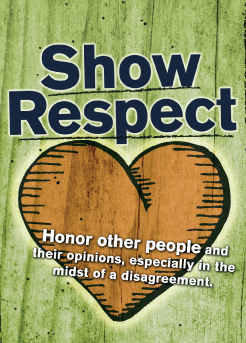Civility Column: Step Away from the Conversation – Part I
- Share
- Tweet
- Pin
- Share

By Susan McAninch
I think I am civil, however, how do I keep engaged with someone who isn’t civil at all? What should I do or say when I am personally attacked by another person? I want to keep talking but it is so difficult!
Thank you for your important questions. I think these questions are on the lips of every person who wants to be committed to civility in everyday life. How do you stay respectful and deal with someone who is not treating you with respect?
This issue is at the heart of civil discourse, and can make or break relationships of all sorts. I would like to use two columns to address your questions. In Part I, I will lay the groundwork and in Part II will provide additional guidelines.
I wish I had answers as concise and succinct as your questions. However, beyond the vague, but true response, “It all depends,” there are no one-size-fits-all answers to your questions. Figuring out how to proceed depends on the context of any encounter. It makes a difference whether you are in a private or public place, or alone or in a group. There may be a power differential between you and the other person. A verbal attack might be generic and mindless, or deeply personal and hurtful. You may even feel physically threatened. You may already be having a bad day and feeling especially vulnerable. Perhaps you scarcely know the other person. Or, the other person may be your spouse or your child. The stakes may be high or relatively insignificant.
Fortunately, there is a guiding principle about being engaged in conversation in this otherwise limitless morass of variables. This principle is about understanding that, above all else, being engaged in genuine dialogue requires an environment of psychological safety. Psychological safety refers to that wonderful state of being comfortable to be and express ourselves without fear of any negative consequences to our self-image, our status, our reputation, or even our career. There is a climate of mutual respect, acceptance, and being heard. Ideas flow freely and we can give and receive just about any message, even blistering criticism.
Now consider what happens when we do not feel comfortable being and expressing ourselves, but instead feel disrespected and fearful of being dismissed or humiliated or embarrassed. With psychological safety now at risk, dialogue comes to a screeching halt. The interaction is no longer about the original purpose. It is now about defending our dignity and protecting ourselves from further harm.
When self-protective defenses go up, we often behave in uncivil ways: sarcasm, silence, speaking in absolutes, pouting, cutting others off, walking away or mounting personal attacks (mocking, belittling, threatening). It is not just difficult, as you have said, but impossible to stay engaged in genuine dialogue when safety is at risk and defenses are up.
Staying engaged with someone whose defenses are up and who is not being civil requires finding a way to restore safety. Responding in a respectful manner to someone who has personally attacked you requires that you not respond with your own attack.
What does it take to restore safety? What does it take to not respond in kind? Stay tuned for Part II.
Susan McAninch is a retired clinical social worker and psychotherapist.


